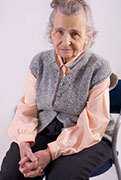- Could Your Grocery Store Meat Be Causing Recurring UTIs?
- Are You Making This Expensive Thermostat Error This Winter?
- Recognizing the Signs of Hypothyroidism
- 10 Strategies to Overcome Insomnia
- Could Artificial Sweeteners Be Aging the Brain Faster?
- Techniques for Soothing Your Nervous System
- Does the Water in Your House Smell Funny? Here’s Why
- Can a Daily Dose of Apple Cider Vinegar Actually Aid Weight Loss?
- 6 Health Beverages That Can Actually Spike Your Blood Sugar
- Treatment Options for Social Anxiety Disorder
Some Benefits of Screening Elderly Women for Breast Cancer Questioned


Including women older than 70 in national breast cancer screening programs won’t lead to a sharp reduction in advanced forms of the disease, a new study finds.
In fact, mass breast cancer screening programs could result in older women being overdiagnosed and overtreated, the Dutch researchers reported.
So, the decision to screen older women for breast cancer should be made on a case-by-case basis, they recommended.
“Instead of using mass screening, the decision to participate in the screening program should be personalized, based on remaining life expectancy, breast cancer risk, functional status and patients’ preferences,” the study authors wrote.
In 1998, the age limit for the national breast cancer screening program in the Netherlands was extended to women between the ages of 69 and 75. However, the researchers said, there is no significant evidence that screening women in this age group is effective.
Using data from the Netherlands Cancer Registry, the researchers identified all new cases of invasive and noninvasive (in situ) breast cancer among women between 69 and 75 years old. The women were diagnosed with the disease between 1995 and 2011.
Of the 25,500 cases identified, the researchers divided the women into three groups: those diagnosed before the introduction of the national screening program (1995 to 1997), those diagnosed afterwards (2003 to 2011) and those diagnosed in-between (1998 to 2002).
The Leiden University researchers also included 13,000 women between 76 and 80 years old to track rates of breast cancer among older women not eligible for screening.
The study, published online Sept. 15 on thebmj.com, showed that new cases of early stage breast cancer among women between 70 and 75 years old increased from 248.7 to 362.9 per 100,000 women after the national screening program was introduced. Although there was a drop in the number of new cases of advanced breast cancer, the absolute decrease was small, from 58.6 cases per 100,000 women before to 51.8 cases after the program started.
In comparison, new cases of early stage breast cancer fell slightly for women between 76 and 80 years old, but the number of new cases of advanced breast cancer was unchanged.
The researchers concluded that for every one advanced-stage cancer diagnosed by screening older women, about 20 overdiagnosed early stage cancers are detected. They noted the overdiagnosis and treatment of breast cancer could take a significant toll on a woman’s quality of life. The researchers added that breast cancer treatments are expensive and may not provide older women, who are more vulnerable to side effects, significant health benefits.
More information
The U.S. Centers for Disease Control and Prevention has more on breast cancer screening.
Source: HealthDay
Copyright © 2026 HealthDay. All rights reserved.










